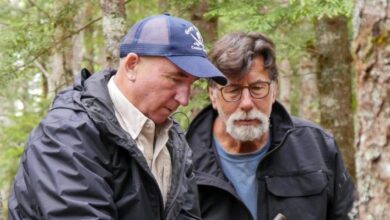Rick Lagina Announced Season 12 Has Been Cancelled Because Of TERRIFYING Discovery
Rick Lagina Announced Season 12 Has Been Cancelled Because Of TERRIFYING Discovery

Rick Lagina just revealed that Season twelve of the Oak Island treasure hunt has been canceled due to a terrifying find underground. The island, long known for its hidden treasures, has seen countless hunters over the years. But something happened that made everyone leave suddenly. What was so frightening that it brought everything to a standstill? We will uncover the chilling discovery that stopped the search in its tracks.
Buried Tunnels Beneath Oak Island’s Shores
The Oak Island saga is downright captivating, filled with unexpected twists right from the start. It all kicked off back in 1862 when the Onslow Company got the idea to dig up what they thought were buried treasures. They dug deep, reaching somewhere between eighty and ninety feet down, but then water started gushing into their pit, completely stopping their work. This strange event got a lot of people really interested and made them come up with a bunch of different ideas about what was going on.
Before we dive deeper, it’s safe to say that what they stumbled upon is far more terrifying than anyone expected, and this is just the beginning of what will leave you speechless.
A popular thought was that tunnels were built from the sea to the dig site, intentionally designed to flood the pit as a way to guard whatever was hidden there. This idea really took off in 1851 when a pretty strange find was made at Smith’s Cove on the island. They found coconut fibers, which definitely don’t belong on Oak Island, buried under the beach. This led a lot of folks to believe that someone had actually built a tunnel to let the seawater flow into the pit to keep the treasures safe.
Over the years, tons of explorers have tried to crack the code of Oak Island, finding new clues that often just led to more head-scratching. The presence of those out-of-place coconut fibers hinted at some big, elaborate plans that might have involved people from all over the world, like pirates or even hidden royal riches.
Things got even more interesting in 1995 when experts from the Woods Hole Oceanographic Institution suggested that what everyone thought were signs of people trying to hide something might just be natural parts of the island. They said the so-called flood tunnels and drains might just be old salt works. They figured the flooding could be coming from natural gaps filled with water, not from some cleverly designed traps.
This ongoing debate, whether it’s all man-made or just a natural occurrence, keeps Oak Island really fascinating. When all the treasure hunting suddenly stopped, it only made people more curious and added more layers to the already complex story of the place.
Then, just when things couldn’t seem more tangled, they found a stone with weird carvings on it ninety feet underground. There are different tales about how it got found and what happened after that, each adding to the thick atmosphere of intrigue surrounding the island.
In James DeMille’s 1872 novel, “The Treasure of the Seas,” he talks about the stone being taken out of a chimney before his characters even get there, putting his own spin on the Oak Island story.
Initially, the markings on the stone just confused everyone—some people even thought they were just random scratches. But the plot thickened with Reginald Vanderbilt Harris’s 1958 book, “The Oak Island Mystery.” Harris said that Jefferson W. MacDonald brought the stone over to Halifax around 1865 or 1866. However, a letter from Blair says MacDonald only looked at the stone, he didn’t move it anywhere. Harris’s story doesn’t have much backing it up.
By 1893, the Oak Island Treasure Company was saying the stone got sent over to Halifax to be looked at more closely. James Liechti supposedly cracked the code on the inscription, suggesting there was a massive treasure just ten feet down. But in 1911, Captain H. L. Bowdoin wrote in Collier’s Magazine that the stone was made of hard basalt and didn’t have any visible carvings on it, making him doubt that any marks had just worn away. At that point, the stone was being shown off in a local guy named Smith’s fireplace on the island, where anyone visiting could see it.
After Smith passed away, the stone was pulled out of the fireplace and taken back to Halifax for experts to check out, but they didn’t find any carvings. It ended up in J.B. McCully’s place in Truro and was shown around to a lot of curious folks. Eventually, it got used by a bookbinder who probably smashed any carvings that were left by using it to hammer leather. Even though the carvings on the stone faded away, leaving more confusion, the search for treasure only grew stronger.
Forgotten Carvings on the Halifax Stone
The stone found its way to a bookstore in Halifax, with nearly all its carvings gone, and nobody really knows where it ended up. But the hunt for treasure went on. Despite all the chatter about the stone, its carvings weren’t looked at again. In Edward Rowe Snow’s 1949 book, True Tales of Buried Treasure, it was claimed that the message on the stone read, “Forty feet below, two million pounds are buried.” Snow mentioned that Reverend A.T. Kempton of Cambridge, Massachusetts, came up with this reading, though Kempton never spilled where he got his info. A letter from April 1949 mentioned that Kempton had heard it from a teacher who had already passed away.
No one really followed up on Kempton’s tip, so the stone just became another part of the bigger Oak Island tale. It once drew a lot of attention but now it’s just a small piece in the larger problem. This whole story highlights how bold and sometimes reckless the people searching for Oak Island’s treasure were, including some pretty famous folks who joined in.
Franklin D. Roosevelt, for example, grew up listening to his seafaring granddad, Warren Delano Jr., tell enthralling tales about Oak Island. These stories sparked a passion that lasted all through his life, from the early 1900s right through his time as president until he died in 1945. Even with all the duties of being President, he kept up with the treasure hunt and even planned a confidential trip to Oak Island in 1939, but it got scrapped because of bad weather and big global issues.
Oak Island also caught the eye of big names like Errol Flynn, the famous Australian-American actor, who put some of his own money into digging efforts. John Wayne, another star, went even further by funding the search and supplying top-notch drilling equipment to help dig up valuable finds. William Vincent Astor, who got rich after his dad died on the Titanic, also backed the project quietly. Rear Admiral Richard E. Byrd, a buddy of Roosevelt, jumped in too, giving strategic advice because he was so drawn to the island. Their shared interest helped them work together on setting up the United States Antarctic Service.
In 1949, a team digging a well in Mahone Bay hit what looked like another treasure pit. Just two feet under the ground, they found a layer of stones and then logs at different depths, some even charred. This made a lot of people think there might be another treasure pit out there. However, Joy Steele suggested something less exciting, saying the original pit might have just been an old tar kiln used back when the island was part of the British naval stores, or maybe a place where people made salt illegally.
Tales about famous pirates like Captain Kidd and Blackbeard, who might have hidden their treasures on the island, really spice up its already fascinating history. Blackbeard, whose real name was Edward Teach, was born around 1680. He became a feared pirate in the early 1700s. Blackbeard was known for his terrifying appearance: he had a long, dark beard tied with ribbons, and during battles, he wore burning fuses under his hat, making him look downright demonic. His ship, the Queen Anne’s Revenge, was a massive French vessel originally used for transporting slaves, armed with forty big guns. It terrorized the waters of the West Indies and the American colonies until Blackbeard met his end in a violent fight against British naval forces in 1718.
Even though the island’s stories are full of interesting bits, some discoveries like a stone found in 1949 with a coded message hinting at a huge treasure lying deep beneath were barely looked into. This message, cracked in Edward Rowe Snow’s book from 1949 with symbols given by Rev. A.T. Kempton, suggested a massive treasure was buried forty feet underground. But, like many other hints on Oak Island, this clue was largely ignored, eventually becoming just another neglected part of the island’s long, rich tale. Despite all the problems and missing clues, stories of hidden treasures kept people excited, bringing famous names and treasure hunters.








